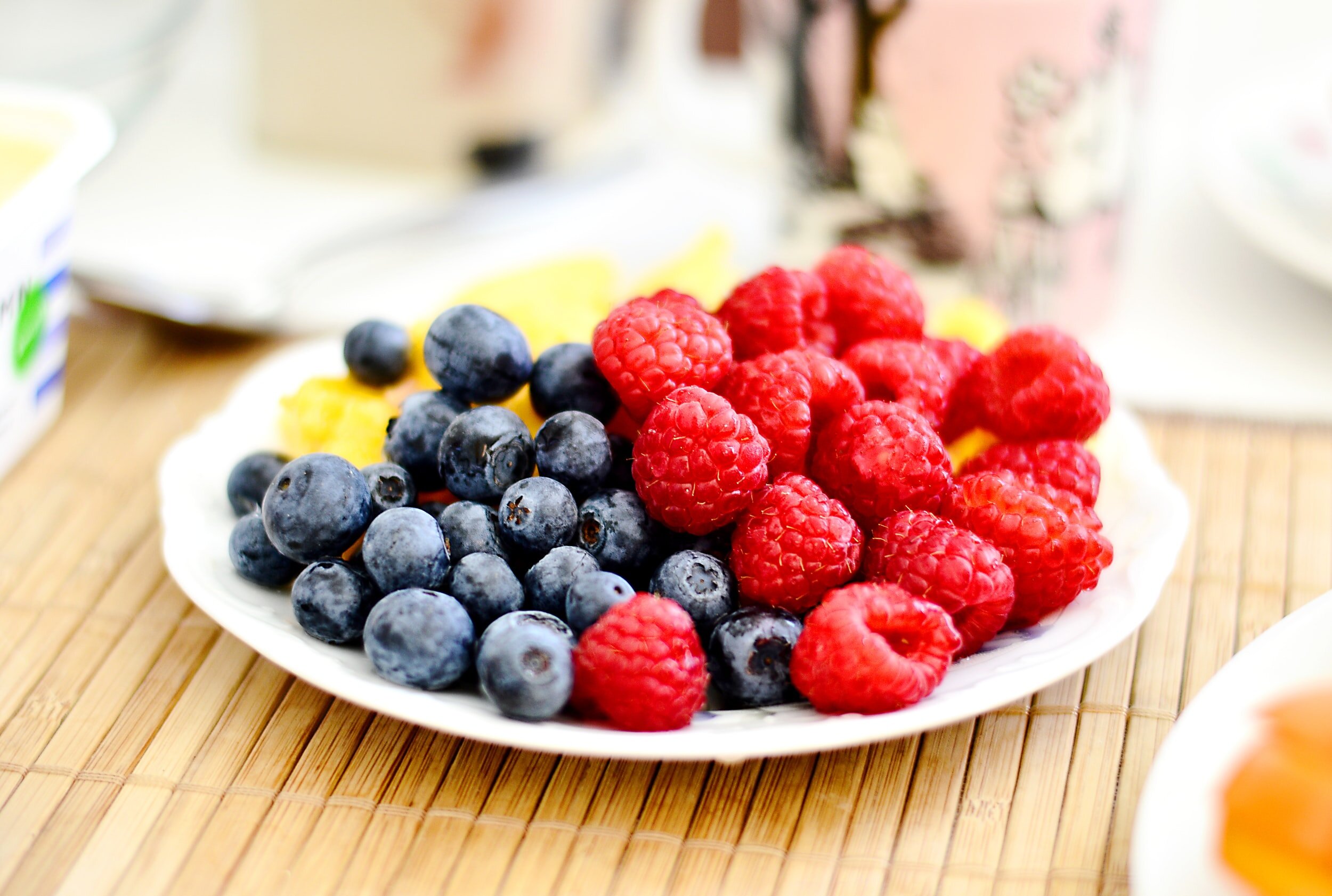Berry Extreme is a powerful assortment of lyophilized (freeze-dried) berries.
Berries (in general) are low in calories and high in minerals, vitamins, and other nutrients. Especially, berries are a great source of antioxidants, such as anthocyanins, ellagic acid, and resveratrol. In addition to protecting your cells, these plant compounds may reduce disease risk. Unlike vitamin supplements, berries contain all the intrinsic and associated factors of vitamins. For example, just 16 grams (4 teaspoons) of Berry Extreme provides 150% of the MDR for Vitamin C — but rather than being an ascorbic acid component of Vitamin C only, that is found in vitamin supplements, the Vitamin C in Berry Extreme includes all 14 components of “real” Vitamin C, and is much more beneficial to health.
When water is removed from fresh foods without using heat (heat would damage the delicate food nutrients), the resulting food powder is much more powerful (gram for gram) than the original food — because it is more concentrated. That is why there is more nutrition from one bag of Berry Extreme than if you ate bushels of the 14 expensive, and often hard-to-find berries that are in Berry Extreme. 16 grams of Berry Extreme provides:
120% of the RDI of Manganese
100% of the RDI of Vitamin K
33% of the RDI of Copper
25% of the RDI of Folate
as well as numerous other nutrients
No class of food has been more often associated with cardiovascular health than berries.
The Berries in Berry Extreme Include: ORAC values shown for each Berry (100-gram standard)
Aronia - 470,000
Acai - 102,700
Sea Buckthorn - 70,000
Bilberry - 61,400
Maqui - 27,600
Goji Berry - 13,500
Lingonberries - 12,000
Cranberry - 9,584
Blueberry - 6,552
Blackberry - 5,905
Raspberry - 5,605
Pomegranate - 4,479
Strawberry 4,302
Beets 1,776
More About Each Berry Type Included In Berry Extreme
Aronia Berry
Aronia berries contain many times higher levels of antioxidants, polyphenols, and anthocyanins than cranberries, blueberries, grapes, and most other fruits. Studies have shown that the antioxidants in Aronia Berry and all antioxidants in general help reduce the risk for many types of diseases in humans and are valuable in delaying the aging process of cells. They are low in sugar, help digestion, help raise HDL cholesterol, improve vision and immune function and help normalize blood sugar.
Bilberry
Bilberries are closely related to blueberries, are native to Europe, and are also known as huckleberry, or European blueberries. They are rich in antioxidants known as anthocyanins and polyphenols. Bilberries have been used for medicinal purposes for conditions ranging from eye conditions to diabetes. They are said to improve both day and night vision. Bilberry is said to strengthen the walls of blood vessels and is sometimes taken orally for varicose veins and hemorrhoids. Some evidence shows they are helpful with digestion and weight loss.
Acai
Acai berries have deep purple skin and yellow flesh surrounding a large seed. They have an earthy taste that's often described as a cross between blackberries and unsweetened chocolate. Acai berries contain numerous vitamins, minerals, and trace minerals, including chromium, zinc, iron, copper, manganese, magnesium, potassium, and phosphorus. They're relatively high in fat, but their main benefit is from their antioxidant anthocyanins. Anthocyanins consumption has been strongly linked to oxidative stress protection. One study has found that regular consumption of anthocyanins can reduce the risk of heart attack by 32 percent in young and middle-aged women.
Sea Buckthorn Berries
Sea buckthorn berries are grown on the sea buckthorn plant (Hippophae rhamnoides), which is a small shrub that grows at high altitudes in the northwest Himalayan region. It is sometimes referred to as the holy fruit of the Himalayas. It is a popular remedy in Ayurvedic and traditional Chinese medicines, it may provide health benefits ranging from supporting your heart to protecting against diabetes, stomach ulcers, and skin damage. It is rich in many nutrients, including potassium, calcium, magnesium, iron, and phosphorus. They also contain good amounts of folate, biotin, and vitamins B1, B2, B6, C, and E. More than half of the fat found in sea buckthorn berries is mono- and polyunsaturated fat, which are two types of healthy fats.
Maqui Berries
Maqui Berry is an exotic, dark-purple fruit that grows wild in South America. The berries have been used medicinally for thousands of years. Today, Maqui berry is marketed as a “super-fruit” due to its high antioxidant content and potential health benefits, including reduced inflammation, blood sugar control, and heart health. Maqui berries are packed with up to three times more antioxidants than blackberries, blueberries, strawberries, and raspberries. In a four-week clinical study, people who took 162 mg of a Maqui berry extract three times daily had significantly reduced blood measures of free radical damage, compared to the control group.
Goji Berries
The Goji Berry is native to Asia, and people in Asia have been using this brightly colored fruit for more than 2,000 years as a medicinal herb and food supplement. Polysaccharides are a primary characteristic of the Goji berry. Goji berries also contain beta-carotene, which is responsible for the orange-red color pigment in Goji berries. Beta-carotene is vital for eye health, bone health, skin health, and cell development. The amount of beta-carotene in Goji berries is among the highest of all edible plants. Goji berries contain large amounts of Vitamins A and C. They have been shown to help improve immune function, help keep blood sugar in normal ranges and improve brain function. In traditional Chinese medicine, they are used to improve liver health.
Lingonberries
Lingonberries are small, red berries dubbed super-fruits due to their nutritional profile and antioxidant content. Though more research is needed, studies suggest that they may promote healthy gut bacteria, weight control, heart health, and blood sugar control — among other benefits. Lingonberries contain amazing phytochemicals that can do wonders for health.
Blue Berries
Blueberries are low in calories, but high in nutrients. They help reduce DNA damage. The antioxidants in blueberries help cholesterol from becoming damaged. They protect aging neurons in the brain to help prevent memory loss. They help the urinary tract and help muscles to recover after strenuous exercise.
Cranberry
Cranberries are related to blueberries, bilberries, and lingonberries. Due to their very sharp and sour taste, cranberries are rarely eaten raw (however in GPS, they are still raw). Cranberries are rich in various healthy vitamins and plant compounds, some of which have been shown to aid the flow of urine through the kidneys. Cranberries are a rich source of several vitamins and minerals, especially vitamin C, which is essential for the maintenance of skin, muscles, and bone. It is also high in manganese which boosts cell growth, metabolism, and the production of endogenous antioxidants. It is also high in Vitamin E, Vitamin K, and copper, which are often low in Western diets.
Blackberries
Blackberries are high in Vitamin C, which is integral to collagen formation in bones, connective tissue, and blood vessels. They're also high in Vitamin K which helps minerals be directed go to the right places in the body, manganese which is helpful for collagen formation and for helping wounds heal. They boost brain health, digestive health, immune health and provide help for maintaining a healthy weight. They are excellent for the skin and help pregnant mothers in reducing the risk of defects in babies.
Pomegranates
Pomegranates contain Punicalagins and Punicic Acid, which are extremely potent antioxidants found in pomegranate juice and peel. Pomegranate seeds have three times the antioxidant activity of red wine and green tea and are useful in protecting against inflammation of all types. They are also rich in dietary nitrates making them good for the heart. Pomegranates are high in Vitamin C, potassium, and Vitamin K.
Raspberries
Red Raspberries contain strong antioxidants such as Vitamin C, quercetin, and gallic acid that fight help fight inflammation and age-related decline. They are high in ellagic acid, a known preventer of cell mutation and repairer of cellular DNA, and have been shown to have anti-inflammatory properties. They are especially high in manganese which helps in the formation of endogenous antioxidants.
Beet Roots
Beets are actually a vegetable. But, they add significant cardiovascular benefits to the berries due to the vegetable nitrates, minerals, and folate. A primary good effect of Beet Roots is cardiovascular elasticity and energy, much of this due to the Fructans (a short-chain carb also found in garlic, leeks, artichokes, asparagus, and onions) in Beets. Beets are also high in Boron which helps promote strong bones, muscles, and a quick responding mind. Beets help improve muscle coordination and critical thinking and helps with detoxification of the body.
Berry Extreme - Frequently Asked Questions
Why Are Berries So Healthy?
The main reason is that they contain powerful antioxidants that help the body overcome free radical overload.
Another reason is that they contain numerous minerals (brought up through the tree and plant capillary system from the ground).
Another reason is that the leaves convert solar energy into healing phytochemicals and vitamins, which are stored in the berries.
A final reason is that they contain very little carbohydrate in comparison to the mineral and other nutrients, It could be said that every calorie one eats "hurts", because minerals and other nutrient resources are required to process each calorie into ATP (the type of energy the cells of the body use to live). Empty calorie foods use up more minerals and nutrient resources in this energy conversion process than are gained from the food. Thus, eating those empty calories foods depletes the body over time, and one is worse off for having eaten them. Berries are the exact opposite, they fill up the body with more nutrients over time than what is used up in processing the calories in the berries.
Can One Take Too Much Berry Extreme Powder?
Yes, anything can be overdone, but up to two tablespoons, a day would be well utilized. But, beyond one tablespoon twice a day, only a very large person could utilize all the nutrients.
Why Is Berry Extreme Better than Eating Fresh Berries?
There are many reasons. But, the # 1 reason is that you don't have to shop for berries every day to get the tremendous nutrition berries to offer.
Another important reason is that you won't be eating mold. Almost from the time that a berry is picked, mold spores start to germinate and grow. They're growing mold during transport from farm to store and in the stores than in your refrigerator. Every day those mold spores keep germinating and growing. So, with fresh berries, you need to consume them completely every few days and buy fresh ones. With Berry Extreme, there's no moisture to allow the mold to germinate. It will last months with no danger of mold growth. So, you get the nutrition and not the mold.
Is It Okay to Add Foods and Sweeteners to Berry Extreme?
Yes. Feel free to mix our Berry Extreme Powder into any protein or nutritional shake, coconut water add Coconut Powder. Stir it into cottage cheese, oatmeal, or other breakfast cereal. For more sweetness, add Monk Fruit, Stevia, Xylitol, Pineapple Juice, grape juice, or whatever you like.
















